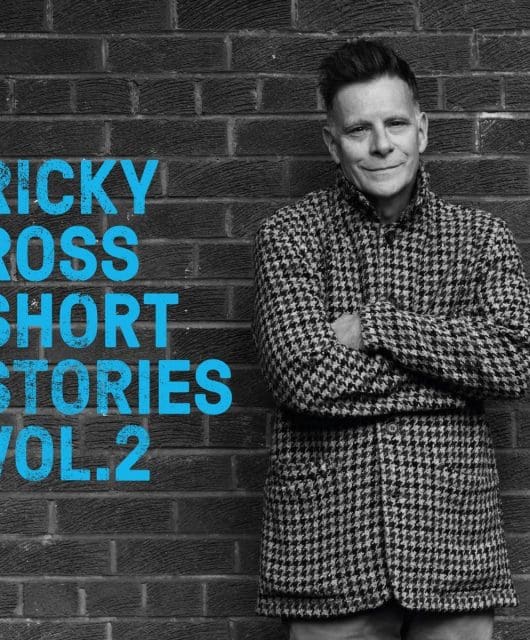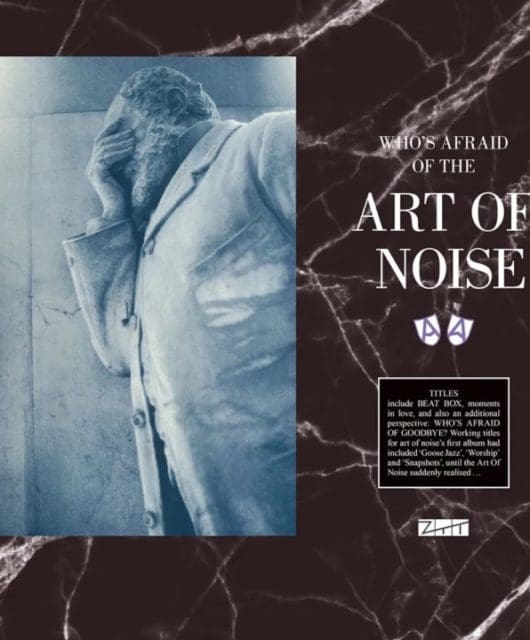Classic Album: ABBA – The Visitors
By Felix Rowe | October 31, 2024
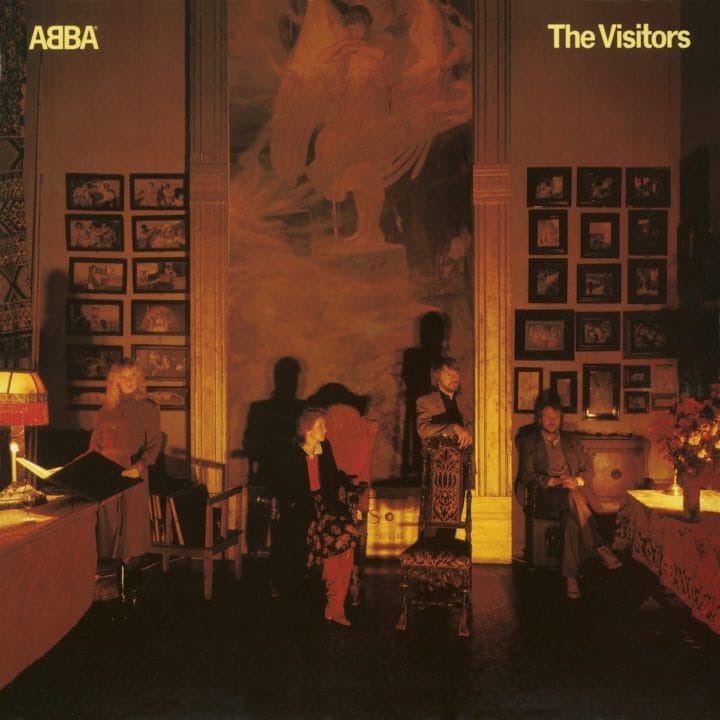
Underneath the pristine sheen of ABBA’s The Visitors was a dark undertone laced with break-up and Cold War paranoia. Despite fading sales, it was nonetheless another pop masterpiece, melding high energy with tears on the dancefloor…
Body language is everything. If you compare the cover photo of ABBA’s first album (and pretty much every other release that followed) with that of their final LP in that original run, the difference is startling. 1973’s Ring Ring – attributed to ‘Björn Benny & Agnetha Frida’ – clearly depicts two happy couples, smiling arm in arm.
It’s repeated again on 1974’s Waterloo, and so forth. Then take The Visitors – not two sets of two, well-lit and tightly-packed within the frame, but four separate individuals standing apart from one another in an open space, almost lurking in the gloom of muted autumnal colours. Instead of the customary warmth and eye contact, each band member stares into space, as if lost in some deep, and possibly troubling, thought.
If the point hadn’t already been made, there’s another clue hidden in plain sight – the large painting of Eros that hangs above their heads. The Greek god of love and sex (analogous with Cupid); the subject of ancient mythological tales associated with overcoming the torturous obstacles of love. The overall composition is almost Wagnerian in its scope and weighty atmosphere. Like the music within, nothing is incidental – the scene has been carefully orchestrated and choreographed for dramatic effect.
Divorce Record
For the uninitiated, The Visitors was ABBA’s divorce record – both personally (in the literal sense) and professionally. It was the eighth and final studio LP of their original run, before a string of compilations and live records followed. It finds the group at their darkest, most sombre and most reflective. Now, dark, sombre and reflective aren’t the three adjectives most typically associated with Sweden’s finest, which is precisely what makes this record such a curious and alluring chapter in their catalogue. At one point, the album’s title track had the working subtitle of ‘Crackin’ Up’.
Essentially, it is the sound of a group self-destructing. While the end result is hardly Joy Division, it presents a rare counterpoint to reappraise ABBA from a novel perspective. ABBA may never be known for injecting grit into their perfectly-constructed pop songs. But, as The Visitors highlights, they certainly weren’t afraid to put their own deeply personal traumas into them.
Perhaps even more fascinating, The Visitors sees the group become more overtly political, injecting Cold War paranoia into their lyrics and arrangements. The title track was later revealed to be a protest against the Soviet regime, and the album was banned in the Soviet Union, after the group publicly stood behind Poland for a US TV broadcast including other global artists and personalities.
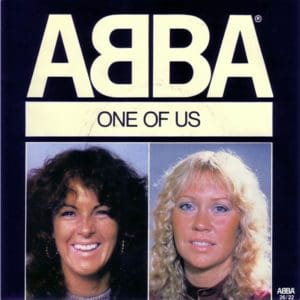
End Of An Era
As if anyone could possibly need reminding, ABBA dominated the 1970s with a gameplan founded on quality and quantity: a group so prolific and committed to refining the formula that they had already released at least two greatest hits records before even writing or releasing their actual greatest hits. They were almost too good – pumping out smash after smash in quick succession, each as good or even better than the last.
On first glance, they looked set to continue the trend, with 1980’s Super Trouper surviving the disco backlash with a back-to-basics record that spawned two No.1 hits, and went on to be the UK’s bestselling album in that year.
But this would turn out to be a final hurrah, rather than the dawn of a new beginning. Scratching beneath the surface, the signs of fatigue were there – both for the group and their fans. The transition into the 80s signified something more foreboding than simply the hangover after the honeymoon. ABBA’s star, that had shined so bright, was on the wane. The first of the two power couples had fallen, with the separation of Björn and Agnetha, resulting in the majestic The Winner Takes It All – regarded as one of their finest works. Never before had heartbreak been so artistically rewarding and so commercially viable too.
With Benny and Frida soon following suit, their future as a functioning collective was put in doubt. In recent interviews, Björn and Benny, suggested that, professionally at least, it was business as usual. Presumably, time has mellowed their memories; earlier accounts from the group had described the tense atmosphere as “difficult” and “frosty”.
Musical Catharsis
But it must have provided some sort of musical catharsis, bringing to mind those other 70s soft rock hitmakers, Fleetwood Mac, again two couples who successfully poured their marital ups and downs directly into their music (creating megahits in the process). How could something so lovingly-crafted come from such pain? Perhaps, it was their final parting gift to each other; though there could be parting potshots, too.
Much is said about the girls singing the guys’ songs, which takes a particularly ironic and almost sinister twist when asking the ex to perform the other side’s perspective on their own break-up.
What’s most interesting is how fantastically accomplished and considered it all sounds. It certainly wasn’t thrown together hastily. While their personal lives were unravelling, they were meticulously creating some of the group’s most intricate, involved and introspective work. Perhaps the personal strife was the very reason that they had to take solace in the music – it was the only place to hide; the only means to fully express how they really felt at the time.
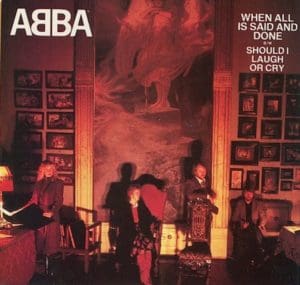
Pristine Production
ABBA were always perfectionists in everything they did. There was no reason to change that ethos now. The Visitors was among the very first albums to be recorded digitally, rather than on analogue tape. The resulting production is pristine – clean, crisp and defined.
Musically, The Visitors is one of the group’s most ambitious, eclectic and accomplished records, hugely impressive in both its scope and vision. It’s a sophisticated collection; at times densely layered, but elsewhere sparse and understated in its arrangements, too.
It continues and expands upon their foray into synthesizers previously explored on Super Trouper. At points, such as the opening title track, it looks to be the quintessential synth-pop record. Elsewhere it ventures into musical theatre (I Let the Music Speak) and 70s troubadour AM radio soft rock Two For The Price Of One).
Cold War Blues
One particularly fascinating element is the lingering sense of Cold War paranoia that hangs like a fog over key tracks. Of course, it’s not the first time that global conflict or geopolitics served as inspiration for the clean-living wholesome pop group (see Fernando about freedom-fighters of the Mexican Revolution, and, of course, Waterloo). But on this occasion, when isolated from the music, the lyrics are chilling on a psychological level: “I hear the doorbell ring and suddenly the panic takes me… they must know by now I’m in here trembling in a terror ever growing.” Clearly the visitors in question are not welcome guests.
If the causes of anxiety, claustrophobia and uneasiness are left ambiguous in the title track, the references to war are more explicit in Soldiers. Neither song would ever be casual first choice selections on the jukebox or karaoke machine. Yet the former is a stellar, glassy synth-pop masterpiece, while the latter is one of finest understated gems they’ve produced. Skulking along on a loping groove, it’s loaded with swagger (another emotion not typically associated with the group). The trippy beat is juxtaposed against the clean and clear vocals to magical effect.
The bonus tracks featured on the 1997 CD reissue (recorded either at the time or immediately afterwards, for the aborted follow-up) hint even further at the darker side ABBA were then exploring. This is most notable on the standalone singes, the creepy Under Attack, and The Day Before You Came – a track loaded with an ambiguous, unspecified dread.
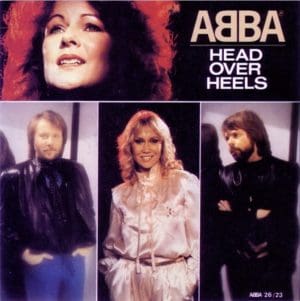
Let The Music Speak
It’s not all doom and gloom. The album remains highly danceable, and at various points there’s pure joy, some light relief and, inevitably, the occasional schmaltz. Excellent songcraft aside, detractors will accuse ABBA of being too polished and too perfect, lacking the rawness and imperfections that give other artists their unique edge.
The diction and delivery is always so precise and exact, clear and crisp, that calls of being just a little bit twee are not entirely without merit.
But, just like The Carpenters, the gloss can often obscure the impressive heavy lifting going on behind the scenes. The group remained resolutely professional and perfectionist right to the very end, producing an album among their finest work, even if the record’s sales didn’t ultimately reflect that.
By all standards bar their own, The Visitors was no flop, enjoying success that mere mortals could only dream of. It topped the charts in seven countries across Europe with Top 5 showings in several more. But compared to their own phenomenal run of hits, it clearly demarked a downward trajectory.
The Morning After
Having saturated the airwaves so fully over the last decade, the world was ready for a change, even if artistically they were in fine form, pursuing an interesting, albeit less immediately populist, path. ABBA had slipped from the zeitgeist.
The lyrics to When All Is Said And Done act as a eulogy not only for the breakdown of marriage, but to the whole group as a functioning unit: “Clear head and open-eyed/ With nothing left untried/ Standing calmly at the crossroads, no desire to run/ There’s no hurry anymore when all is said and done.”
If Dancing Queen embodied the endless Saturday night disco, then The Visitors is the Sunday morning after – a shattered mirrorball on the floor the last reminder of what was, but is sadly no more.
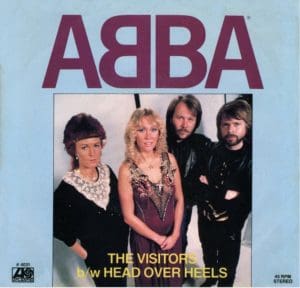
Guilt-Free Pleasures
Until recently, The Visitors was ABBA’s swansong. Now, of course, with Voyage, a brand new chapter has been added, ending the story on a positive note of redemption and rebirth, as opposed to separation and heartbreak. And that’s only right. Yet The Visitors will remain the last true ABBA record to feature the classic backing band line-up before their original (and rarely acknowledged) rhythm section passed away.
As we all know, ABBA’s stock is now higher than ever. International treasures and guilt-free pleasures, meaning we can just enjoy it for what it is: cracking good pop music. Fifty years on from their historic Eurovision victory, they’ve recently achieved the highest possible honour in their native Sweden: Commander of First Class, of the Royal Order of Vasa, by their King.
Today, The Visitors is still the oddball curio of ABBA’s catalogue. It’s not a generous provider to ABBA Gold or either of the Mamma Mia! film soundtracks. And just one of its songs (When All is Said And Done) has been selected to be performed by the ABBAtars at the critically-acclaimed Voyage show. But somewhere, in an alternative universe devoid of their mid-70s imperial phase, these tracks are the star players they deserve to be.
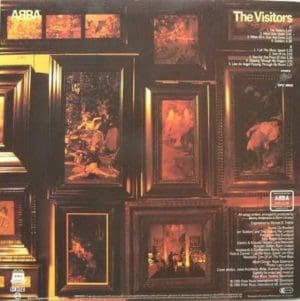
The Songs
The Visitors
It’s an uncharacteristically jarring opening, with electronically-processed, almost dissonant, vocals from Anni-Frid atop an apocalyptic synth soundscape. The result is all very arty synth-pop, before morphing from its subdued beginning into a more classic ABBA sound of a rousing glam stomp from the full band. The chilling lyrics reference persecution of political dissidents in the Soviet Union. It was the fourth single (in the US released as a double A-side with When All Is Said And Done). Far too idiosyncratic to be an international hit, although it reached the top spot in Costa Rica.
Head Over Heels
Released as a single, Head Over Heels, which features Agnetha on lead vocals, didn’t do particularly well by ABBA’s meteoric standards. It really should have done, though, because it’s an absolute cracker. After its oh-so-ABBA chromatic melody in the verse, it’s pure pleasure when the chorus kicks in, bringing to mind The Human League in their imperial phrase. The entire vibe is straight off Dare, with its bright synth brass stabs, snappy, tight drums and an infectiously groovy bassline.
When All Is Said And Done
A song explicitly about the separation of Anna-Frid and Benny. Frida would later say: “All my sadness was captured in that song.” It’s a classic example of tears on the dancefloor, and Frida excels at making heartbreak sound so upbeat and uplifting, with a firm resolve that carries it forward. It’s a notably more positive outlook compared to The Winner Takes It All, with both parties leaving on an equal footing: “Neither you nor I’m to blame when all is said and done.” There’s something of Bonnie Tyler electro power ballad about this – a rousing call-to-arms with soaring vocals set to electronics and a four-to-the-floor beat. With a bit of imagination, it’s the kind of empowering, bombastic track that Bruce Springsteen could easily refashion as a guitar-driven belter with the E Street Band.
Soldiers
Another track that features Cold War themes, Soldiers was originally titled ‘Peasants’, and ABBA Gold describes it as “bleak-yet-catchy”. Their commentary on cannon fodder kicks off with a skittish beat, like soldiers marching (but way more funky). Despite the dark subject material, it’s insanely hooky, and brimming with those deliciously clever chord change modulations that only ABBA can do so well. Meanwhile, the descending vocal melody of the chorus cascades in perpetual motion like Escher’s waterfall. While ABBA are notoriously reluctant to clear samples, this groove (complete with a skulking fretless bass) is seriously crying out to be utilised by a hip-hop group if it hasn’t already – at once both melancholy and incredibly uplifting.
I Let The Music Speak
Despite everything that life may throw at you, there’s always the healing power of music. One of ABBA’s more ambitious and theatrical tracks, the boys saw it as a precursor to their musicals, like Chess. And you can really hear that in the arrangement. I Let The Music Speak is a real showstopper, with interesting interludes and changes of tempo. It’s a self-contained mini operetta, with its acrobatic melody and lush orchestration, featuring trilling woodwind, sweeping strings, and syncopated choral accents. It’s off the wall – like something Sparks would create (although done with a knowing wink). Totally self-indulgent, grandiose and knowingly over the top, I Let The Music Speak is essentially Benny and Björn’s audition for Broadway. And they got the part.
One Of Us
The lead single off the record, sung by Agnetha. Until their recent return, it was ABBA’s last big hit, reaching No.1 in several European countries, and entering the Top 3 in the UK. Huge props should be given to the band’s bassist Rutger Gunnarsson for his funky chops. There are distinct echoes of this song in Ace Of Base’s Billboard No.1 The Sign with its bouncy, vaguely-reggae-ish groove, and the buoyant melody (particularly in the chorus). Its continued resonance is highlighted by Cher’s 2018 cover. An album highlight.
Two For The Price Of One
The “obligatory Björn-sung” track, according to the liner notes in ABBA Gold. This marmite track gets mixed reviews – fun, even genius, light relief, or “banal” novelty album filler, depending on personal taste. It’s a light-hearted track with a twist at the end – a lonely man responds to a love column ad, anticipating a ménage à trois, only to be met by a young woman… and her mother. And as the punchline drops, comedic effect is emphasised as the instrumentation switches into a Beatles-eque big band – blasting out a bit of ‘oom pah pah’ into the coda. Only the squealing distorted guitar places it in the earlier 80s. Otherwise, it could easily be a soft-rock AM radio track from the mid-70s. With some nice harmonies and counterpoints, it could be almost Steely Dan’s yacht rock. Certainly the lightest and most throwaway track on the record, but not necessarily a bad thing.
Slipping Through My Fingers
Written by Björn, and sung by his ex-wife, Agnetha, it was inspired by the sad realisation of seeing their daughter Linda growing up so fast. Note the childlike quality to the vocals sung in unison in the second verse. It was released as a single in Japan, only, as a Coca Cola promo (complete with an almost comically happy, shiny cover photo: the four leaning shoulder to shoulder, all smiles and primary colours – the polar oppositive of parent album’s gloomy concept). There was a Spanish translation version, too. It’s very schmaltzy and saccharine in production and execution, it’s nonetheless a finely crafted pop song as you’d expect from ABBA. More recently, it was covered by rising star, Declan McKenna.
Like An Angel Passing Through My Room
The final track opens with the sound of a ticking clock, marking the passing of time, which continues throughout and ends as it starts. It’s very nursery rhyme-like in its quality, and that figures with an original working title of “Twinkle Twinkle” on which the original melody was based. They experimented with various incarnations of the track in different styles, including an up-tempo disco treatment, before settling on the more stripped-back version. The boys saw it as one of their greatest accomplishments, although apparently remain unsure as to whether they managed to create the definitive version. It was later covered by Elvis Costello and Anne Sofie von Otter.
Should I Laugh Or Cry (1997 edition bonus track)
Though originally recorded during the sessions, this exquisite and criminally overlooked track was bizarrely left off the album, only to languish as a B-side until the 1997 reissue. It’s perhaps a sign of their confidence in the other material that it was culled – though, we’d argue it’s more in keeping in tone and deserving of inclusion than Two For The Price Of One. At distance in 2024, its taut and precise, non-fussy synth-pop style sounds bang up to date: slinky guitars intertwine with shimmering arpeggiated synths, with oodles of space in between. The bitterness and regret of the lyrics are tempered by the bounciness of the groove. So much of this stuff has been pouring out in the charts since the 2010s onwards: The Sound Of Arrows, Pnau, Chvrches, La Roux, and The Weeknd would all kill for a track like this.
The Day Before You Came (1997 edition bonus track)
While recorded a short while after the release of The Visitors, it bears acknowledging as the natural conclusion to the themes explored in that era. The song cleverly juxtaposes the banality of life in the lyrics, with a sense of underlying dread in the music, centring around a key event in the woman’s life that has dramatic but unspecified consequences. It’s very subtle, the impact hinging on much reading between the lines and ambiguity (like the ending of Lost In Translation). Space is left intentionally for the listener to put their own interpretation on it. Though released as a single (with a lukewarm reception at the time), it’s now regarded by many fans as one of their most underrated masterpieces. Rightly so.
For more ABBA click here
Read more: The phenomenon of Swedish pop


